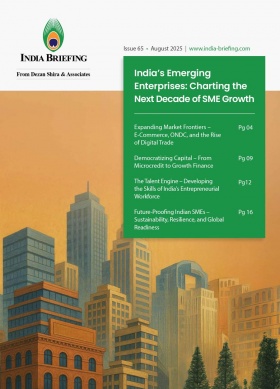Winners and Losers: India’s Online Gaming Bill Elevates E-Sports, Bans Real-Money Gaming
India has introduced the Promotion and Regulation of Online Gaming Bill, 2025, which establishes a regulatory structure for e-sports and social gaming, while strictly prohibiting real-money and betting games. The law outlines stringent penalties, bars related financial transactions, and grants power to central authority to regulate India’s online gaming industry.
The lower house of the Indian parliament has approved the Promotion and Regulation of Online Gaming Bill, 2025, designed to establish a regulatory framework for e-sports, educational, and social gaming in India.
Under the legislation, cleared in Lok Sabha on August 20, 2025, online money-based and betting games are strictly prohibited, along with their advertising and promotion. The bill also bars payment service providers and financial intermediaries from facilitating transactions related to such games.
India’s online gaming bill 2025: Key provisions
The central government has proposed a legislative framework that distinguishes between three categories of online gaming: e-sports, social games, and online money games. While e-sports and social gaming will be supported and promoted, online money-based and betting games are to be strictly prohibited.
The Bill provides for the establishment of a central authority responsible for coordinated policy support, strategic development, and regulatory oversight of the sector. This body will act as the nodal institution to guide the growth of legitimate online gaming while ensuring effective governance and regulation.
The legislation further prohibits the offering, operation, facilitation, advertisement, promotion, and participation in online money games through any digital medium, whether within India or across state and international borders.
The framework is designed to protect individuals—particularly youth and vulnerable groups—from the adverse social, economic, psychological, and privacy-related risks associated with such games.
Once the proposed law receives clearance from both Houses of the Parliament and receives the President’s accord, it will be known as the Promotion and Regulation of Online Gaming Act, 2025.
Definition of e-sports under the bill
Under the Bill, e-sports refers to online games that are played as part of multi-sport events and involve organized competitive tournaments between individuals or teams. These competitions are conducted in multiplayer formats and are governed by predefined rules.
E-sports in India are officially recognized under the National Sports Governance Act, 2025, and must be registered with the designated authority or agency. The outcome of such games is determined entirely by the skills of the players—such as physical dexterity, mental agility, or strategic thinking.
The framework allows for registration or participation fees, which can be used to cover administrative costs, and players may receive performance-based prize money. However, e-sports explicitly exclude any form of betting, wagering, or staking by participants or spectators.
Online gaming classification: Games of skill and games of chance
Under Indian law, online games are broadly classified into two categories—games of skill and games of chance. Games of skill are those where success depends primarily on the player’s ability, knowledge, training, or strategy. In contrast, games of chance are governed mainly by luck or random outcomes and are treated as gambling activities.
The Supreme Court has affirmed that games where skill outweighs chance are legally recognized as games of skill and cannot be considered gambling. This distinction forms the foundation for regulating online gaming in India, with games of chance, especially those involving money, facing strict prohibitions.
Applicability of the proposed gaming legislation
Under the Promotion and Regulation of Online Gaming Bill, 2025, the term “person” is defined broadly to cover both natural and legal entities. It includes:
- Individuals (any natural person)
- Hindu Undivided Families (HUFs)
- Companies incorporated under relevant laws
- Firms (partnerships or otherwise)
- Associations of persons or bodies of individuals, whether incorporated or not
- The State itself
- Any artificial juristic person not covered in the above categories (for example, trusts, cooperatives, or other legal entities recognized by law)
The Bill ensures that its provisions apply not only to individuals but also to organizations, businesses, groups, and even government bodies.
Prohibitions under the online gaming bill
The Promotion and Regulation of Online Gaming Bill, 2025 sets out clear prohibitions aimed at curbing money-based online gaming activities. It prohibits individuals or entities from offering, operating, assisting, or engaging in online money games or related services.
The Bill also places restrictions on advertising and promotion. Any form of advertisement, whether direct or indirect, that encourages or promotes online money gaming is prohibited. These restrictions extend across all types of media, including digital and electronic platforms.
In addition, financial transactions connected to online money games are expressly barred. Banks, financial institutions, and payment facilitators are not permitted to process or authorize payments associated with such activities.
Offences and penalties incase of violation
The Bill prescribes stringent penalties for violations relating to online money gaming. Any person who offers such services in contravention of Section 5 may face imprisonment of up to three years, a fine of up to INR 10 million (US$114,596), or both. Similarly, those who create or publish advertisements promoting online money games, in violation of Section 6, can be punished with imprisonment extending to two years, a fine of up to INR 5 million (US$57,298), or both. Facilitating financial transactions for such games, as prohibited under Section 7, attracts the same punishment as offering the games: imprisonment up to three years, a fine up to INR 10 million (US$114,596), or both.
Repeat offences
The Bill imposes stricter consequences for repeat violations. In cases involving the offering of services or facilitation of financial transactions under Sections 5 and 7, a subsequent conviction carries a minimum imprisonment of three years, which may extend to five years, along with a fine ranging from INR 10 million(US$114,596) to INR 20 million (US$229,196.8). For repeat violations of advertising provisions under Section 6, the penalty includes a minimum of two years’ imprisonment, extendable to three years, in addition to a fine between INR 5 million (US$57,298) and INR 10 million (US$114,596).
Cognizable and non-bailable offences
The law designates offences under Sections 5 and 7—relating to offering online gaming services and facilitating financial transactions—as cognizable and non-bailable. This classification reflects the seriousness of the offences and ensures more stringent enforcement.
Corporate liability
When an offence is committed by a company, liability extends to both the company itself and the individuals in charge of its operations at the time of the violation. However, individuals may avoid liability if they can demonstrate that the offence occurred without their knowledge or that they exercised due diligence to prevent it. Where the offence is proven to have resulted from the consent, connivance, or neglect of directors, managers, or officers, such individuals are deemed personally liable. Independent and non-executive directors, provided they were not involved in decision-making, are expressly exempt from liability.
Non-compliance with directions
The Bill empowers the central government and the designated authority to issue directions or orders to individuals and entities. Failure to comply with such directions may lead to penalties of up to INR 1 million (US$11,460), suspension or cancellation of registration, and prohibition from offering or promoting online games. Importantly, no action can be taken without first providing the concerned party with an opportunity to be heard.
India’s online gaming industry in 2025
As per a media report published on March 19, 2025, India’s online gaming industry’s revenues are projected to rise from US$3.7 billion in 2024 to US$9.1 billion by 2029. An industry report has noted that real money gaming (RMG) remains the dominant segment, contributing nearly 86 percent of total revenues in 2024. While RMG is expected to continue driving the market, its share may ease to around 80 percent by 2029, allowing non-RMG segments to expand their footprint.
India has nearly 591 million gamers—about one-fifth of the global gamer base—and recorded 11.2 billion mobile game downloads in 2024. Around 1,900 gaming companies operate in India, employing 130,000 professionals. As per reports, oreign investors have also shown strong interest, with US$3 billion in FDI already channeled into the industry, of which 85 percent has been directed to the Pay-to-Play segment.
This momentum, however, coincides with a stricter policy environment. The Promotion and Regulation of Online Gaming Bill, 2025 introduces prohibitions on offering real money games, advertising such services, and processing related financial transactions. Violations attract severe penalties, including imprisonment, fines, and corporate liability.
The legislation casts a shadow on the online gaming industry in India, posing uncertainty for companies and investors.
Goods and services tax (GST) on online gaming in India
Taxation of online gaming in the country has experienced major revamps in recent years. In 2023, India revised the GST framework by shifting real-money online gaming to a 28 percent GST on the full value of deposits or bets, replacing the earlier system that taxed only the platform fee (or gross gaming revenue). This revised framework came into effect on 1 October 2023 through amendments to the GST law and rules.
Under the current GST regime, the tax treatment of online games depends on their nature:
- Games of skill: These are games where outcomes are primarily determined by strategy, knowledge, or expertise. They are classified as a service and attract 18 percent GST.
- Games of chance (based on luck): These are games where outcomes depend predominantly on luck. They are classified as actionable claims, attracting 28 percent GST on the full face value of deposits/bets, along with applicable cess.
Industry reaction to the online gaming bill
The introduction of the Online Gaming Bill has raised concerns within India’s skill-gaming sector. According to several media reports, leading industry associations such as the All India Gaming Federation (AIGF), E-Gaming Federation (EGF), and Federation of Indian Fantasy Sports (FIFS) have jointly appealed to the central government for a re-evaluation.
These bodies cautioned that a blanket ban on all real-money games, including skill-based formats, would devastate the sector. Industry leaders further warned that such a move could result in massive job losses, discourage legitimate investments, and push millions of users toward unregulated offshore betting platforms.
The federations emphasized that India’s online skill-gaming industry, valued at over INR 2 trillion (US$22.91 billion), generates around INR 310 billion (US$3.55 billion) in annual revenue and contributes more than INR 200 billion (US$2.29 billion) in taxes. With a projected 20 percent CAGR, the sector is regarded as a “sunrise industry” expected to double in size by 2028.
Conclusion
The Promotion and Regulation of Online Gaming Bill, 2025, is a major shift in India’s policy landscape for the gaming sector. By formally recognizing and supporting e-sports and social gaming, the Bill seeks to encourage innovation and structured growth in segments deemed legitimate. At the same time, the prohibition of real-money and betting games underscores the government’s intent to safeguard individuals—particularly vulnerable groups—from potential financial and social risks.
While the framework introduces clarity through defined categories, regulatory oversight, and strict enforcement mechanisms, it also raises questions about the future of the industry’s largest revenue segment.
(US$1 = INR 87.26)
About Us
India Briefing is one of five regional publications under the Asia Briefing brand. It is supported by Dezan Shira & Associates, a pan-Asia, multi-disciplinary professional services firm that assists foreign investors throughout Asia, including through offices in Delhi, Mumbai, and Bengaluru in India. Dezan Shira & Associates also maintains offices or has alliance partners assisting foreign investors in China, Hong Kong SAR, Vietnam, Indonesia, Singapore, Malaysia, Mongolia, Dubai (UAE), Japan, South Korea, Nepal, The Philippines, Sri Lanka, Thailand, Italy, Germany, Bangladesh, Australia, United States, and United Kingdom and Ireland.
For a complimentary subscription to India Briefing’s content products, please click here. For support with establishing a business in India or for assistance in analyzing and entering markets, please contact the firm at india@dezshira.com or visit our website at www.dezshira.com.
- Previous Article New Financial Rules in India Effective July 1, 2025: What Businesses Need to Know
- Next Article India’s New Income Tax Act, 2025 Notified: Key Changes and Implementation Timeline











